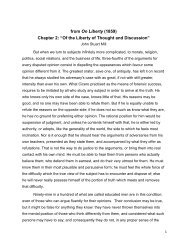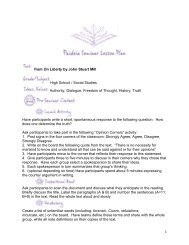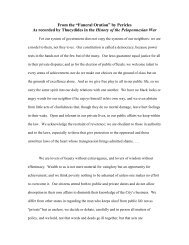Rousseau_contrat-social
You also want an ePaper? Increase the reach of your titles
YUMPU automatically turns print PDFs into web optimized ePapers that Google loves.
BOOK II<br />
1. THAT SOVEREIGNTY IS INALIENABLE<br />
THE first and most important deduction from the principles we have so<br />
far laid down is that the general will alone can direct the State<br />
according to the object for which it was instituted, i.e., the common<br />
good: for if the clashing of particular interests made the establishment<br />
of societies necessary, the agreement of these very interests made it<br />
possible. The common element in these different interests is what forms<br />
the <strong>social</strong> tie; and, were there no point of agreement between them all,<br />
no society could exist. It is solely on the basis of this common<br />
interest that every society should be governed.<br />
I hold then that Sovereignty, being nothing less than the exercise of<br />
the general will, can never be alienated, and that the Sovereign, who is<br />
no less than a collective being, cannot be represented except by<br />
himself: the power indeed may be transmitted, but not the will.<br />
In reality, if it is not impossible for a particular will to agree on<br />
some point with the general will, it is at least impossible for the<br />
agreement to be lasting and constant; for the particular will tends, by<br />
its very nature, to partiality, while the general will tends to<br />
equality. It is even more impossible to have any guarantee of this<br />
agreement; for even if it should always exist, it would be the effect<br />
not of art, but of chance. The Sovereign may indeed say: "I now will<br />
actually what this man wills, or at least what he says he wills"; but it<br />
cannot say: "What he wills tomorrow, I too shall will" because it is<br />
absurd for the will to bind itself for the future, nor is it incumbent<br />
on any will to consent to anything that is not for the good of the being<br />
who wills. If then the people promises simply to obey, by that very act<br />
it dissolves itself and loses what makes it a people; the moment a<br />
master exists, there is no longer a Sovereign, and from that moment the<br />
body politic has ceased to exist.<br />
This does not mean that the commands of the rulers cannot pass for<br />
general wills, so long as the Sovereign, being free to oppose them,<br />
18











